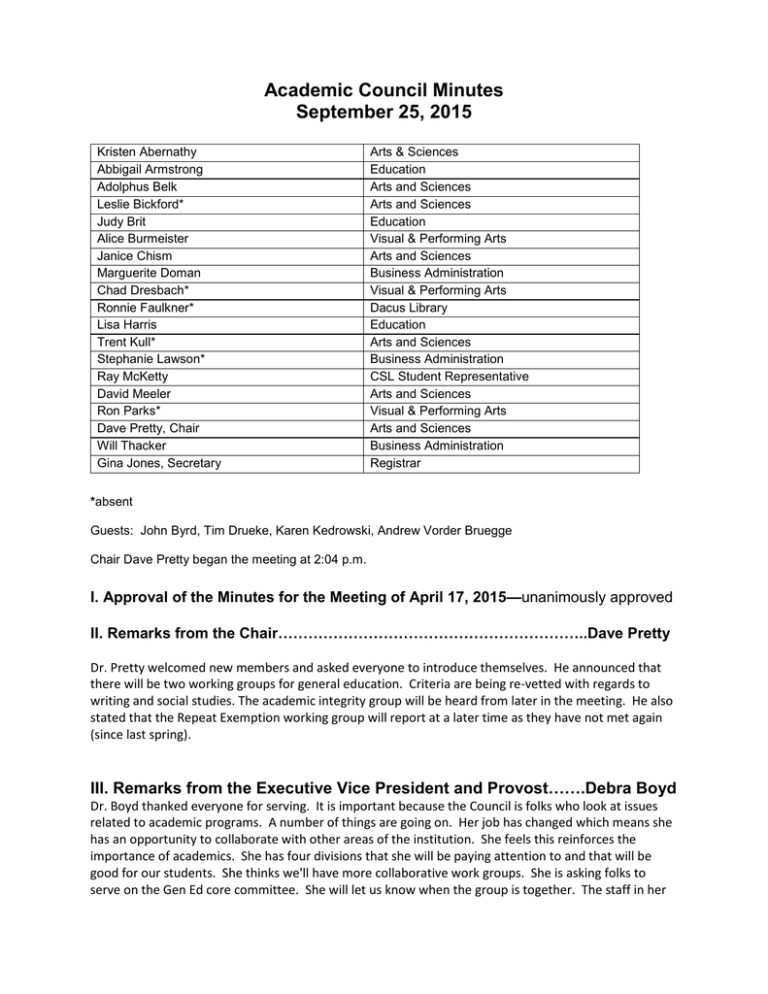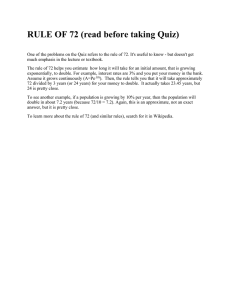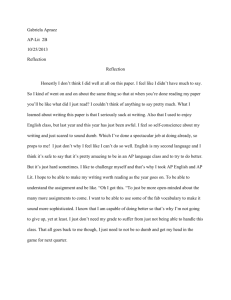Academic Council Minutes September 25, 2015
advertisement

Academic Council Minutes September 25, 2015 Kristen Abernathy Abbigail Armstrong Adolphus Belk Leslie Bickford* Judy Brit Alice Burmeister Janice Chism Marguerite Doman Chad Dresbach* Ronnie Faulkner* Lisa Harris Trent Kull* Stephanie Lawson* Ray McKetty David Meeler Ron Parks* Dave Pretty, Chair Will Thacker Gina Jones, Secretary Arts & Sciences Education Arts and Sciences Arts and Sciences Education Visual & Performing Arts Arts and Sciences Business Administration Visual & Performing Arts Dacus Library Education Arts and Sciences Business Administration CSL Student Representative Arts and Sciences Visual & Performing Arts Arts and Sciences Business Administration Registrar *absent Guests: John Byrd, Tim Drueke, Karen Kedrowski, Andrew Vorder Bruegge Chair Dave Pretty began the meeting at 2:04 p.m. I. Approval of the Minutes for the Meeting of April 17, 2015—unanimously approved II. Remarks from the Chair……………………………………………………..Dave Pretty Dr. Pretty welcomed new members and asked everyone to introduce themselves. He announced that there will be two working groups for general education. Criteria are being re-vetted with regards to writing and social studies. The academic integrity group will be heard from later in the meeting. He also stated that the Repeat Exemption working group will report at a later time as they have not met again (since last spring). III. Remarks from the Executive Vice President and Provost…….Debra Boyd Dr. Boyd thanked everyone for serving. It is important because the Council is folks who look at issues related to academic programs. A number of things are going on. Her job has changed which means she has an opportunity to collaborate with other areas of the institution. She feels this reinforces the importance of academics. She has four divisions that she will be paying attention to and that will be good for our students. She thinks we'll have more collaborative work groups. She is asking folks to serve on the Gen Ed core committee. She will let us know when the group is together. The staff in her office are getting different assignments. There will be a report from the competitive compensation committee soon. She reminded everyone that we made a decision not to do something quick and dirty. It needs to be a process that goes on indefinitely. The goal is to make sure we understand this and this will be a multi-step process. We do have a little bit of money in the budget for compensation this year. It's important to get this line in the budget. The people working on this are being deliberative and thorough. Dr. Boyd announced that the president has put together working groups for strategic planning. His sense was we don't need to reinvent the wheel. Each of these groups has a variety of people who aren't necessarily on other standing committees. She assured members they will have an opportunity along the way, just not at the beginning of the process. She asked everyone to encourage their colleagues not to fret that they are not on these working groups. IV. Committee Reports A. CUC…………………………………………………………………… Will Thacker The following program change Items (Degree) was approved by Academic Council: Degree Major BA Conc. Department PSYC Psychology Action MODIFY PROGRAM: Allow a maximum of 3 semester hours for PSYC 471 and/or 472 toward the major and up to 6 semester hours of PSYC 471 and/or PSYC 472 towards the BA Dr. Meeler asked how this change was different. Dr. Kedrowski explained that currently, only three hours can count in the degree. This will allow another three hours that can be applied toward the degree. B. General Education……………………………………………Lisa Harris The following courses were approved by Academic Council as new General Education Courses: Courses: First Certify Global: HIST 549 GEOG303 Historical: HIST 549 Humanities & Arts: VPAS 115 Technology: GEOG 320 Courses which were re-certified by the Gen Ed Committee: Constitution: EDUC 312/ HIST 312 Historical: EDUC 312/ HIST 312 Humanities & Arts: EDUC 312/ HIST 312 Global: EDUC 315 GEOG 306 Social Science: EDUC 315 V. Remarks from Council of Student Leaders Chair……………………Ray McKetty Ray introduced himself and stated he was excited to be here. He said it was cool to see the dedication the professors have for students. VI. Old Business A. Report of General Education Working Group on the Technology Requirement Note: What follows is the version of the General Education Technology Requirement criteria as revised by the Technology Requirement Criteria Working Group in 2014-15. The descriptions of the proposed criteria presented here were edited for clarity and consistency by Janice Chism, Chair Academic Council, 2014-15, and Laura Glasscock, Chair General Education, 2014-15. These edits were submitted to the Working Group in April 2015 and accepted by that group as being in accord with the group’s intentions. J.C. 9/10/15 The General Education Technology Requirement Criteria There are 6 criteria involved in determining if a class fulfills the technology requirement for general education at Winthrop University. A class meeting the technology requirement must have technology as its primary educational focus and must include digital citizenship. The technology focus may be discipline specific. A class must meet a minimum of 2 of the 4 remaining requirements to meet the general education curriculum requirements. The class must: 1. have technology as its primary educational focus. 2. must advance students’ abilities to use, manage, and examine the impact of digital tools, digital information and digital operations as they relate to Digital Citizenship. Digital Citizenship encompasses areas such as: analyzing the appropriateness of online resources, impact of technology in a professional setting, ethical and responsible use of digital tools, Internet and digital safety, and management of one’s professional and personal digital footprint. (NOTE: Any class meeting the general education requirement must meet these 2 primary requirements and at least 2 of the remaining 4.) 3. advance students’ ability to use current digital tools (e.g. software, hardware, technological infrastructure) while preparing them to stay current in the advances and changing landscape of digital tools. 4. advance students’ understanding, and mastery of digital tools, information, and resources as applied to general or discipline specific research, project management, project development or evaluation. 5. advance students’ ability to use, apply, and evaluate the impact of digital tools, digital operations, digital information and/or technological infrastructure for communication and collaboration. 6. advance the students’ ability to apply digital tools, digital information, and digital operations in context as it relates to problem solving, decision making, creativity, design and critical thinking. Members of the Academic Council had asked this to be tightened up. Dr. Chism stated these were the criteria but the group had some misunderstanding of some of the italicized wording [in the original document]. She worked with Dr. Marshall Jones to tidy up the language. Dr. Boyd asked for a summary the changes. Dr. Chism said that the previous requirements were based on technology from the 1990s and were prescriptive in what students need to know. We didn't want to tell students they had to know a specific platform. We wanted the requirements general enough to accommodate changing technology. The group added the idea of appropriate digital citizenship. Dr. Thacker indicated that there were seven criteria, but only two to four have to be met in a course. Dr. Chism responded that they left it open so that it could be discipline specific. Dr. Meeler asked if there was any guidance for instructors about what should be the primary focus. Dr. Thacker said this should be found in the syllabus. This will get translated into the Gen Ed form by Dr. Gloria Jones. Dr. Bird commented that one of the recommendations of the Gen Ed Committee was for this to be met in the major. He then asked if it could be reworded to say technology is "a" primary focus rather than (its)"the" primary focus? Discussion ensued on biology courses currently meeting the technology requirement, but technology is not "the" primary focus. It is "a" focus. Dr. Meeler stated that this brings up whether we want courses to meet the requirement or programs of study to meet the requirement. Dr. Chism indicated that for biology, the technology is more integrated, and developing a new course specifically to meet the technology requirement would be a weird course. Dr. Bird proposed for the members to think about any course that comes up: it meets the first two criteria and two of the other four. Does it do what we want? Dr. Boyd thinks students will see this as having to take a technology course. She doesn't think this is intended to be complicated. Dr. Thacker stated that he thinks we should allow for flexibility but ensure that more than half a class is related to technology. Dr. Kedrowski said there is motivation to develop courses because they can be used in the major. Dr. Chism said that one thing that is critical is that you don't want everyone to be taking a handful of courses. Dr. Pretty asked Dr. Harris if she had a strong opinion on this. She said no, so she took over as chair for the remainder of the discussion. Dr. Pretty said other general education courses, such as physical activity and quantitative, have primary goals. He welcomes the wording to reflect this. Dr. Meeler indicated that gen ed should be integrated. Dr. Vorder-Bruegge asked if everything has to be "primary?" Dr. Pretty stated that there are a number of courses which have more than one primary focus. Dr. Bird indicated that if we are sticklers on something like this, we are producing hurdles for students. Dr. Chism pointed out that if we make it more prescriptive, then the Gen Ed Committee will have to figure out whether it is or isn't. Dr. Pretty stated he has seen this happen. Dr. Thacker said he is swayed by decision to move to "a" primary focus. Dr. Meeler moved that we changed "its" to "a". There was further discussion. Dr. Bird said there will be a form the committee will have to look at to determine the criteria. Dr. Boyd stated this comes to a level of confidence in our committee. Faculty who teach technology courses can weigh in on this. Are we contemplating the ability of transfer students to show competence or mastery? Dr. Pretty said there is not always going to be a technology person on the committee. Dr. Boyd said they can always ask. The motion carried with one nay. Dr. Thacker made a motion that we change "class" to "class or group of classes." Dr. Pretty asked for a friendly amendment to change that throughout the preamble and criteria. Dr. Doman was concerned that this would cause a watering down of the requirement. Dr. Meeler asked if we would need to change the requirement to zero-seven to accommodate groups of courses. Dr. Thacker indicated no, that we only have to put the minimum. Dr. Vorder Bruegge said maybe we should table this until we can get the wording right. Dr. Thacker stated that this is unique in that technology is being encouraged to be met in the major. The oral requirement was mentioned as also being able to be met with a group of courses. Dr. Byrd said this goes back to the flexibility of the program. While these can be met in major, they don't have to be. A vote was taken and the motion passed. Dr. Pretty then motioned to change "its" in the preamble to "a." The motion was approved. Dr. Pretty made another motion to insert "recognizing that programs are encouraged to meet this requirement in the major" in the preamble before the third sentence. The motion was approved. Dr. Britt commented about the word “digital” being used multiple times. Dr. Bird indicated he believed those were for emphasis. Dr. Thacker moved that we accept the criteria. This motion was also approved. B. Report from the Working Group on Academic Integrity…………Adolphus Belk In 2013-14, Dr. Belk sated that his group received a charge to look at the Burmeister report from 2003. They came up with an honor code and pledge and sent them to departments in 2014-15, and this is what came back: HONOR CODE As a member of the Winthrop community, I will exhibit honesty, integrity, and responsibility in all academic endeavors. HONOR PLEDGE I have exhibited honesty, integrity, and responsibility on this assignment, and have neither given nor received unauthorized assistance. These were well received by the departments. These are back to Academic Council for consideration. Dr. Belk stated that he would like a web presence for this. It would let students know of the process. We haven't had discussion of what goes into that yet. Dr. Burmeister asked if this would this be a tutorial or just informational. Dr. Belk said he had had some conversation with Dean Marlowe about this. Dr. Burmeister also asked when students would sign this. Dr. Belk indicated this would be on assignments and tests. Dr. Chism inquired if these would be in the Student Handbook? Dr. Thacker asked if we could vote on the actual code/pledge and come back at a later date to determine how to implement. He then motioned that we support this code and pledge. Dr. Bird declared this is awesome and a great thing between students and faculty. Dr. Meeler motioned for friendly amendment to add "I" in the honor pledge in the second part of the sentence. Dr. Burmeister indicated a concern about how this is going to be implemented. Dr. Pretty said the charge had to begin somewhere. There will be an Academic Integrity Implementation working group. Mr. Drueke mentioned that from a practical standpoint, this honor pledge and code could not be voted on at Faculty Conference until there is discussion and an implementation plan. The motion was approved. Revised honors Pledge: HONOR PLEDGE I have exhibited honesty, integrity, and responsibility on this assignment, and I have neither given nor received unauthorized assistance. Dr. Pretty suggested a subcommittee for implementation of the honor code/pledge. He asked Mr. MeKetty who agreed, and Dr. Burmeister volunteered. Dr. Doman and Dr. Abernathy volunteered also. VII. New Business A. General Education Working Groups on the Social Science Requirement and on the Writing in General Education Courses Requirement Dr. Pretty met with [Sociology/Anthropology department chair] Jon Marx on this. VIII. Announcements--none IX. Adjournment Adjourned at 3:53 PM Respectfully Submitted, Gina Jones, Secretary


